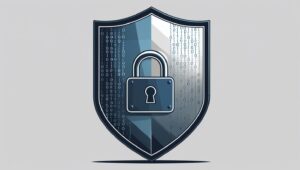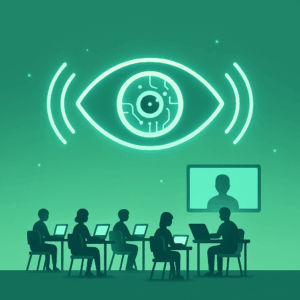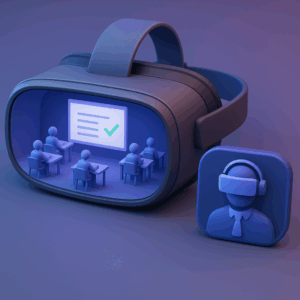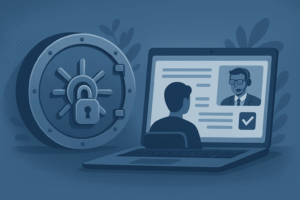In recent years, online proctored exams are getting immense popularity as a convenient and accessible alternative to traditional in-person testing. As more and more institutions shift towards remote learning and work, online proctored exam software has become a crucial tool. It is helpful for educators and employers to assess their students’ or employees’ knowledge and skills.
This blog post will explore different aspects of remote proctored examinations. Here are some tips to help you prepare for your next online proctored exam. Whether you are a student preparing for a high-stakes exam or an employer looking to administer assessments to your workforce, this post will provide you with the necessary information. It will help to make informed decisions about online proctored exams. So, let’s start!
What Is An Online Proctored Exam?

An online proctored exam is a remote exam that a proctor or invigilator supervises via the internet. In an online proctored exam software, the test-taker is under the monitoring of the proctor through video, audio, and screen-sharing technology. Such functionality allows the proctor to observe the test-taker and their surroundings in real time.
During the exam, the proctor verifies the test-takers identity, ensures that the testing environment is secure, and monitors the test-takers behavior to prevent cheating. The proctor may also provide technical support and assist the test-taker in resolving any technical issues that may arise during the remote proctoring exam.
Online proctored exams are becoming increasingly popular due to their convenience and accessibility. They can be taken from any location with a reliable internet connection and a suitable testing environment, eliminating the need for test-takers to travel to a physical testing center. However, it is essential to note that remote proctored examinations may have different rules and procedures in comparison to in-person exams, and it is necessary to understand these requirements before taking the exam.
How Does Online Proctoring Software Work?
Online proctoring software like Proctortrack is used to monitor test-takers during an online exam, to ensure that they follow the rules and regulations of the exam. Also, it can function in tandem or independently with online examination software. Here’s how it typically works:
Before the exam: The test-taker must download and install the online proctoring software on their computer or device. They may also need to create an account and provide personal information for identification purposes.
Verification of identity: Before the exam begins, the online proctoring software verifies the test-takers identity using various methods such as facial recognition, fingerprint scanning, or ID verification. This ensures that the person taking the exam is the same person registering for it.
Monitoring the exam: Once the exam starts, the software uses various methods to monitor the test-taker. This includes video and audio monitoring, screen sharing, and browser locking. The proctoring software records the test-taker’s activity and flags any suspicious behavior. Like looking away from the screen, using a mobile phone or other devices, or trying to access other applications or websites.
Reviewing and reporting: After the exam, the proctoring software provides an in-depth report to the exam administrator, highlighting any suspicious activity or violations of the exam rules. The administrator can then review the report and decide whether or not to take action. It can lead to a scenario such as disqualifying the test-taker’s exam results.
An online proctoring system uses various technologies to monitor test-takers and ensure that they follow the exam rules in sync with the online assessment software. It provides a secure and convenient way to conduct exams online while maintaining the integrity of the testing process.
Benefits Of Online Proctored Examination Software

Online proctored examination software offers several benefits over traditional methods of testing, some of which include:
Convenience: Online proctored examinations can be taken from anywhere, at any time, as long as there is a reliable internet connection. This eliminates the need for test-takers to travel to a testing center. As it allows them to take the exam from the comfort of their own homes or workplaces.
Cost-effective: Online proctored examinations are typically more cost-effective than in-person testing, as there is no need to pay for physical testing centers or proctors.
Security: Online proctoring technology such as Proctortrack offers a high level of security, using various tools to prevent cheating, such as webcam monitoring, screen recording, and browser locking. This ensures that the results of the exam are accurate and reliable.
Time-saving: Online proctored examinations can take place and provide evaluation quickly, as the software has the functionality to grade multiple-choice and short-answer questions automatically. This means that test-takers can receive their results much faster than with traditional methods.
Flexibility: Online proctored examinations are customizable to fit the needs of individual test-takers or organizations. For example, the software helps create exams with different difficulty levels. Also, it offers accommodations for individuals with disabilities.
Online proctored examination software offers several benefits, making it an attractive option for many organizations and test-takers. It provides a convenient, secure, and cost-effective way to administer exams while offering flexibility and fast results.
Types Of Online Proctored Exams
Several online proctored exams can be administered using online proctoring software. Some of the common types include
Academic exams: Online proctoring software helps administer academic exams such as midterms, finals, and placement tests. These exams are typically time-bound and require strict monitoring to prevent cheating.
Certification exams: Online proctoring software can also administer certification exams for professional certifications. These exams often require strict security measures to ensure the integrity of the exam results.
Remote job interviews: Online proctoring software helps conduct remote job interviews, which can help employers to evaluate candidates from different locations. The software can monitor the candidate’s behavior during the interview to ensure that they follow the rules and regulations.
Compliance training: Online proctoring software can help administer compliance training and assessments, which are in demand in many industries to ensure that employees understand and comply with laws, regulations, and company policies.
Language proficiency exams: Online proctoring software can be used to administer language proficiency exams, which are used to test the ability of individuals to speak, write, and understand different languages. These exams are often helpful for language learning and certification programs.
Online proctoring software helps administer various types of exams and assessments. It provides a flexible and convenient way to evaluate individuals’ knowledge and skills.
Types of Online Proctoring Methods

Several types of online proctoring methods monitor test-takers during online exams. Here are some of the most common types in use alongside online assessment software:
Live online proctoring: An online proctor monitors the exam in real-time through a webcam. The proctor observes the test-taker’s behavior. Proctors can intervene if they detect suspicious activity or rule violations during remote proctoring exams.
Automated proctoring: This method uses artificial intelligence (AI) and machine learning to monitor the test-taker’s behavior during the exam. The software can detect suspicious activity promptly. Like looking away from the screen, speaking aloud, or attempting to access other applications or websites.
Recorded proctoring: This method records the test-takers behavior during the exam and then reviews the recording later to detect any suspicious activity. The recording can be helpful as evidence of cheating or other violations.
Advanced proctoring: This method uses a combination of live, automated, and recorded proctoring to provide higher security and accuracy. It can also include additional security measures such as biometric authentication, secure browser, and keystroke analysis.
Proctored assessments with ID verification: This method includes a manual process of verifying the test-taker’s identity by asking them to show a government-issued ID or another form of identity verification document during the exam. The online proctor monitors these documents live and validates the identity.
Each type of online proctoring method has its benefits and limitations. The choice of method often depends on the level of security and accuracy required for the exam. Also, the available resources and budget are important factors. Institutions should evaluate the compatibility of the online examination software they use with the proctoring method they choose.
DO’s and DON’Ts of an Online Proctored Exam
Here are some general DOs and DON’Ts to keep in mind when taking an online proctored exam:
DOs:
- Test your equipment and internet connection before the exam to ensure they are working correctly.
- Familiarize yourself with the exam platform and the instructions for the exam.
- Check the exam requirements, such as the permitted materials, before the exam and have them ready.
- Ensure you have a quiet, well-lit environment where you won’t get disturbance during the exam.
- Follow the exam instructions carefully and ensure that you submit your answers within the timeline.
- Contact technical support if you encounter any issues during the exam.
- Stay calm and focused during the exam, and remember to take breaks as needed.
DON’Ts:
- Don’t attempt to cheat or use unauthorized materials during the exam. This could result in severe consequences, including disqualification from the exam or penalties from the exam board.
- No communication with anyone during the exam, except for technical support if necessary.
- Do not try to bypass the proctoring system or the exam platform in any way.
- Avoid using any software or technology with explicit permission under the exam rules.
- Don’t leave the exam environment or use devices other than the computer or laptop specified for the exam.
- Don’t engage in any behavior that appears suspicious or irregular. Such as covering your face, talking to yourself, or looking off-screen for an extended period.
- Don’t attempt to disrupt the proctoring system, the exam platform, or the exam process in any way.
Tips to Prepare for Online Proctored Test
Here are some helpful tips to help you prepare for an online proctored test:
Check your equipment: Ensure your computer or laptop, webcam, microphone, and internet connection are all in good working order. Run a test to make sure they meet the requirements for the exam.
Familiarize yourself with the exam platform: Learn how to use the exam platform and become familiar with the features, such as the timer, navigation buttons, and how to submit your answers.
Read the exam instructions carefully: Understand the exam requirements, including the permitted materials, time limit, and any other essential details.
Create a quiet and comfortable environment: Choose a quiet and well-lit space to take the exam, free from distractions or interruptions.
Prepare your materials: Gather any materials that are permitted for the exam, such as a calculator, pen, or scratch paper, and have them ready before the exam starts.
Dress appropriately: Dress as you would for an in-person exam, as some exam proctoring systems may require you to show your surroundings and may have specific guidelines on dress code.
Test the proctoring software: Run a test to ensure it is installed and working correctly. Some exam proctoring software may require downloading and installing software or browser extensions.
Have a backup plan: In case of technical issues during the exam, have a backup plan, such as a phone number to contact technical support or a backup device.
Manage your time: Ensure you have enough time to complete the exam by planning ahead and allocating enough time for each question.
Stay calm and focused: Try to relax and stay focused during the exam, and take breaks as needed to maintain concentration.
In a Nutshell
online proctored exam software like Proctortrack is a breakthrough technology that offers credibility to online education and assessment processes. While institutions should use online assessment software and proctoring. Also, they need to consider their requirements and resourcing capacity before opting for a particular method/software. It’s important to be ready with equipment and the right strategies to succeed. Following these tips and best practices can boost your confidence and increase your chances of performing well in your online proctored exams. Remember to stay calm, manage your time effectively, and familiarize yourself with the exam platform and requirements. With these tools in your arsenal, you can easily tackle your online proctored exams and achieve your academic or professional goals.











